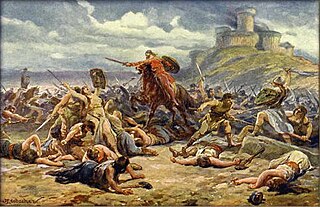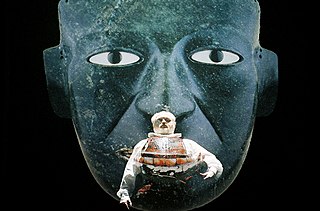
Josef Suk was a Czech composer and violinist. He studied under Antonín Dvořák, whose daughter he married.
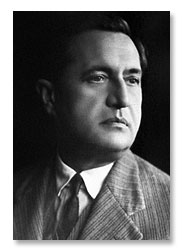
Václav Talich was a Czech conductor, violinist and pedagogue.
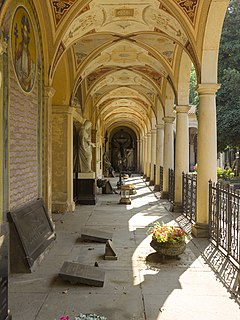
Established in 1869 on the grounds of Vyšehrad Castle in Prague, Czech Republic, the Vyšehrad cemetery is the final resting place of many composers, artists, sculptors, writers, and those from the world of science and politics. The centerpiece of the cemetery is the Slavín tomb designed by Antonín Wiehl, a large and notable tomb located within Vyšehrad cemetery.

Zdeněk Fibich was a Czech composer of classical music. Among his compositions are chamber works, symphonic poems, three symphonies, at least seven operas, melodramas including the substantial trilogy Hippodamia, liturgical music including a mass – a missa brevis; and a large cycle of piano works called Moods, Impressions, and Reminiscences. The piano cycle served as a diary of sorts of his love for a piano pupil. He was born in Všebořice (Šebořice) near Čáslav.

The National Theatre in Prague is known as the alma mater of Czech opera, and as the national monument of Czech history and art.
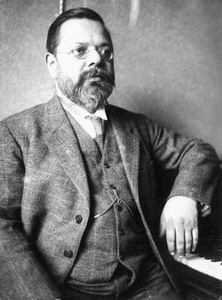
Otakar Zich was a distinguished Czech composer and aesthetician.

Šárka, opus 51, is an opera in three acts by Zdeněk Fibich to a Czech libretto by Anežka Schulzová, his student and lover. Fibich composed the full score over the period of 8 September 1896 to 10 March 1897. At the time, Czech audiences regarded Fibich with suspicion as being overly influenced by the music of Richard Wagner, and Fibich had selected the legend of Šárka for this operatic subject to try to counter such sentiments. Even so, the opera still contains use of Wagner's idea of leitmotif.
Kytice z pověstí národních, also known by the short title Kytice, is a collection of ballads by the Czech author Karel Jaromír Erben. The collection was first published in 1853 and was originally made up of 12 poems. Lilie was added to the second edition in 1861.
- Kytice
- Poklad (Treasure)
- Svatební košile
- Polednice
- Zlatý kolovrat
- Štědrý den
- Holoubek
- Záhořovo lože
- Vodník
- Vrba (Willow)
- Lilie (Lily)
- Dceřina kletba
- Věštkyně (Seeress)
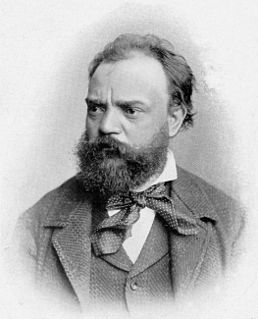
Dimitrij is an opera by Antonín Dvořák in 4 acts, set to a libretto by Marie Červinková-Riegrová. More specifically, it belongs to the genre of Grand opera.

Zdeněk Nejedlý was a Czech musicologist, music critic, author, and politician whose ideas dominated the cultural life of what is now the Czech Republic for most of the twentieth century. Although he started out merely reviewing operas in Prague newspapers in 1901, by the interwar period his status had risen, guided primarily by socialist political views. This combination of left wing politics and cultural leadership made him a central figure in the early years of the Czechoslovak Socialist Republic after 1948, where he became the first Minister of Culture and Education. In this position he was responsible for creating a statewide education curriculum, and was associated with the early 1950s expulsion of university professors.
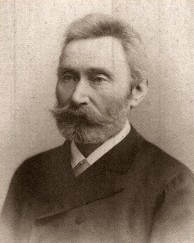
Antonín Bennewitz was a Bohemian violinist, conductor and teacher. He was in a line of violinists that extended back to Giovanni Battista Viotti, and forward to Jan Kubelík and Wolfgang Schneiderhan.
Ivo Žídek was a Czech lyric tenor, known for his vivid portrayals of character roles in the operas of Smetana, Dvořák and Janáček.
Antonín Švorc was a Czech operatic bass-baritone. He studied with J. Berlíka at the Prague Conservatory before making his professional opera debut at the Liberec Theatre in 1955 where he was committed for one year. He joined the roster of principal artists at the National Theatre in Prague in 1956. He performed at that theatre until 1962 when he joined the Prague State Opera (PSO) where he performed for the next several decades. In 1985 he was named a People's Artist of Czechoslovakia and in 2003 he was honored with a Thalia Award. Retired from the stage, he taught on the voice faculty at the Prague Conservatory.
Šárka is an old female given name of Bohemian origin. In the Czech Republic, it is the seventy-second most common female name.
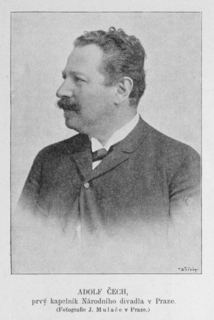
Adolf Čech was a Czech conductor, who premiered a number of significant works by Antonín Dvořák, Bedřich Smetana, Zdeněk Fibich and other Czech composers. He also led the first performances outside Russia of two operas by Pyotr Ilyich Tchaikovsky and the Czech premieres of seven operettas by Jacques Offenbach. He was also a bass singer and a translator of opera librettos.

Eva Randová is a Czech operatic mezzo-soprano who made an international career based in Germany. She appeared at major opera houses including the Metropolitan Opera, and at festivals such as the Bayreuth Festival. She is known for performing Czech operas by Leoš Janáček and Antonín Dvořák.

